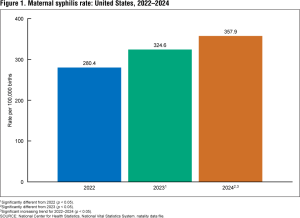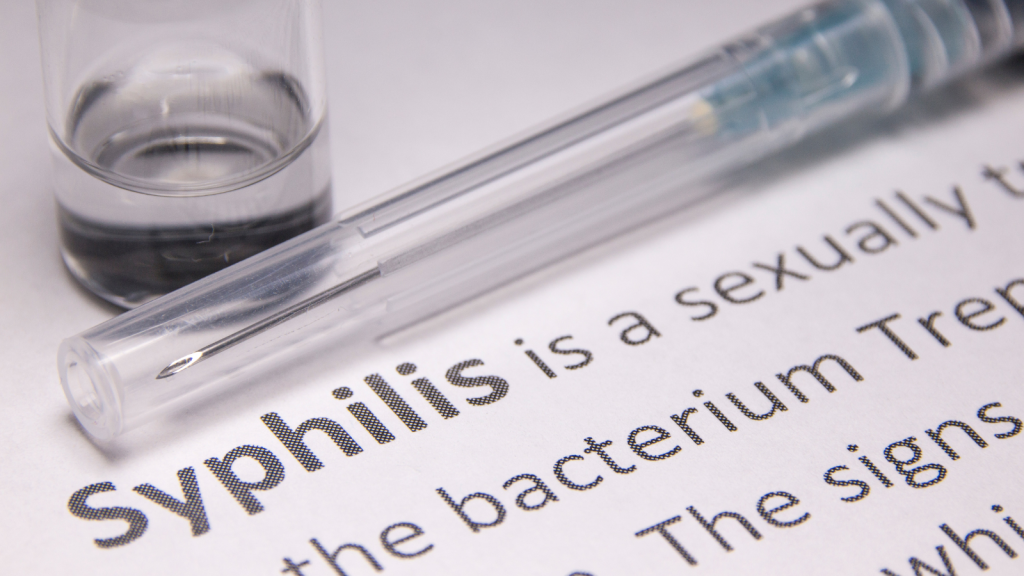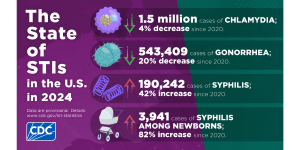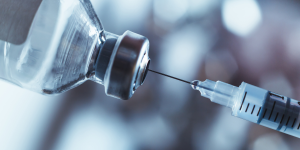
Syphilis Rates in Pregnant Women Continue to Rise
Syphilis rates among pregnant women went up 222% percent between 2016 and 2022 and another 28% between 2022 and 2024. This alarming increase shows too many pregnant women are not being screened.

An antibiotic that is important in the fight against syphilis will once again be hard to find, this time because of a voluntary recall by the manufacturer. Bicillin L-A, also called penicillin G benzathine, is the preferred treatment for primary and secondary (P&S) syphilis in adults, infants, and children. It is the only approved treatment for syphilis in pregnant patients. There have been multiple shortages of this medication in the last decade, and experts say it has hampered our ability to reduce the rapidly rising rates of syphilis and prevent congenital syphilis.
Syphilis is a bacterial infection that is passed through skin-to-skin contact with infected lesions. It can be treated with antibiotics. If left untreated, later stages of syphilis can cause damage to the brain, heart, nervous system.
Congenital syphilis is an infection passed from mother to baby during pregnancy or birth. There has been an alarming rise in cases of congenital syphilis over the last decade. In 2023, there were 3,800 cases of congenital syphilis reported compared to just 335 in 2012. Congenital syphilis can cause miscarriage, stillbirth, and even infant death. Babies born with syphilis can face lifelong medical issues.
Syphilis in newborns can be prevented by testing and treating pregnant women. Experts say that prenatal care that includes syphilis screening is vital. Many states mandate one or more syphilis tests during pregnancy. Others are working with hospitals to implement opt-out screening processes. This would mean that all pregnant women who are seen in a health care environment such as an emergency room are told they will be automatically tested for syphilis unless they specially ask to opt out.
Of course, these measures can only work if we also have the resources to treat anyone who tests positive. Bicillin-L-A is the preferred treatment in part because it is given as a long-acting shot. For many people this is easier than oral medication, and it cuts down on the possibility of missed doses. Shortages of Bicillin-L-A have made widespread treatment difficult in recent years.
The first shortage began in 2005 and lasted almost five years. In 2017, there was another shortage which the manufacturer, Pfizer, blamed on increased demand. Then in June 2023, Pfizer announced a manufacturing delay that led to shortages of the drug through 2024.
This new shortage is the result of a voluntary recall of certain lots. (Click here to see which lots are affected.) Pfizer announced the recall on July 10, noting that particles could be seen floating in some of the vials. The company said that the particles came from an outside vendor that supplies stoppers for the vials. While no one has been hurt by the contaminated medication yet, the company felt a recall was warranted.
Pfizer says it’s committed to get its stock back up as soon as possible and promised a mid-August update. Until then, the company plans to ration the supply of the shots by asking providers to send in a request form for every dose. The company will send supplies out on a per-patient basis.
The CDC is also recommending that providers do their own kind of rationing by saving doses of Bicillin-L-A for pregnant people and babies and using doxycycline for other populations. The agency is also reminding clinicians of the importance of thorough exams as a way to properly stage syphilis infections because patients with earlier stages of the infection need less Bicillin L-A.
During the previous shortage, the FDA authorized imported versions of the medication that had only been approved in other countries. This emergency authorization still stands, and providers can consider using these medications as well.

Syphilis rates among pregnant women went up 222% percent between 2016 and 2022 and another 28% between 2022 and 2024. This alarming increase shows too many pregnant women are not being screened.

The CDC just released STI Surveillance Data for 2024 that show cases of chlamydia, gonorrhea, and syphilis are slowly declining.

A new study found that a single shot of benzathine penicillin G (BPG) treated early syphilis as well as the standard three-injection regimen.

A new report from the Centers for Disease Control (CDC) shows that we’re missing opportunities to prevent congenital syphilis and save lives.

Many people who take doxy PEP say it gives them peace of mind in their relationships and sex life. We sat down with Oscar Alexis, Efthimios, and Maxfield Haynes to talk about doxy PEP and get their perspective.

A new study found that opt-out screenings for all patients in emergency departments caught numerous cases of syphilis and HIV that would have gone undetected under other screening protocols.

Two studies published in this month’s JAMA Internal Medicine offer encouraging findings about the use of Doxy PEP.

According to the Great Plains Tribal Epidemiology Center, syphilis rates among Native Americans in Iowa, Nebraska, North Dakota, and South rose 1,865% from 2020 to 2022.
ASHA believes that all people have the right to the information and services that will help them to have optimum sexual health. We envision a time when stigma is no longer associated with sexual health and our nation is united in its belief that sexuality is a normal, healthy, and positive aspect of human life.
ABOUT
GET INVOLVED
ASHA WEBSITES
GET HELP
© 2026 American Sexual Health Association
We need to know if we can keep you company during this visit. We are useful for making this site work.
We use cookies to enhance your browsing experience. You can choose which cookies you want to accept.
Necessary cookies help make a website usable by enabling basic functions like page navigation and access to secure areas. The website cannot function properly without these cookies.
| Cookie | Provider | Purpose | Expiry |
|---|---|---|---|
digiconsent | This website | Stores your cookie consent preferences. | 1 year |
wordpress_logged_in_* | WordPress | Identifies logged-in users and their authentication details. | 14 days / Session |
wordpress_sec_* | WordPress | Stores authentication details for secure areas. | 14 days / Session |
wp-settings-* | WordPress | Stores user interface customization preferences. | 1 year |
wp-settings-time-* | WordPress | Stores the time when wp-settings cookie was set. | 1 year |
Analytics cookies help us understand how visitors interact with our website by collecting and reporting information anonymously. This helps us improve our website.
| Cookie | Provider | Purpose | Expiry |
|---|---|---|---|
_ga | Registers a unique ID to generate statistical data on website usage. | 2 years | |
_ga_* | Used by Google Analytics to store and count pageviews. | 2 years |
Marketing cookies are used to track visitors across websites. The intention is to display ads that are relevant and engaging for the individual user.
Functional cookies enable the website to provide enhanced functionality and personalization. They may be set by us or by third party providers.